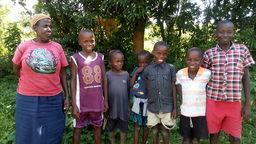This article first appeared on the blog of Intentional Insights, a nonprofit organization that empowers people to refine and reach their goals by providing research-based content to help improve thinking, feeling, and behavior patterns.
It feels great to see hope light up in the eyes of a beggar in the street as you stop to look at them when others pass them by without a glance. Their faces widen in a smile as you reach into your pocket and take out your wallet. "Thank you so much" is such a heartwarming phrase to hear from them as you pull out five bucks and put the money in the hat in front of them. You walk away with your heart beaming as you imagine them getting a nice warm meal at McDonalds due to your generosity.
Yet you can multiply that positive experience manifold! Imagine that when you give five dollars, you don't give just to one person, but to seven people. When you reach into your pocket, you see seven smiles. When you put the money in the hat, you hear seven people say "Thank you so much."
You can get that benefit through giving directly to people in the developing world.
We don't see those seven people in front of us and thus we don't pay attention to the impact we can have on them, a thinking error called attentional bias. Yet if we know about this thinking error, we can solve what is known as the "drowning child problem" in charitable giving, namely not intuitively valuing the children who are drowning out of our sight. If we keep in our minds that there are poor people in the developing world, just like the poor person we see on the street in front of us, we can remember that our generosity can make a very high impact, much more impact per dollar than in the US, in developing countries through our direct giving.
GiveDirectly is a nonprofit that enables you to give directly to poor people in East Africa. It provides direct cash transfers to poor people who live on an average of $.65 per day. You certainly can't buy a McDonald's meal for that, but $.65 goes far in East Africa.
GiveDirectly locates poor people who can benefit most from cash transfers, enrolls them in its program, and then provides each household with about a thousand dollars to spend as it wishes. The large size of this cash transfer results in a much bigger impact than a small donation. Moreover, since the cash transfer is unconditional, the poor person can have true dignity and spend it on whatever most benefits them.
Helida, for example, used the cash transfer she got to build a new house. You wouldn't intuitively think that was most useful thing for her to do, would you? But this is what she needed most. She was happy that as a result of the cash transfer "I have a metal roof over my head and I can safely store my farm produce without worries." She is now much more empowered to take care of herself and her large family.
What a wonderful outcome of GiveDirectly's work! Can you imagine building a new house in the United States on a thousand dollars? Well, this is why your direct donations go a lot further in East Africa.
With GiveDirectly, you can be much more confident about the outcome of your generosity. I know that when I give to a homeless person, a part of me always wonders whether he will spend the money on a bottle of cheap vodka. This is why I really appreciate that GiveDirectly keeps in touch and follows up with the people enrolled in its programs. They are scrupulous about sharing the consequences of their giving, so you know what you are getting by your generous gifts.
GiveDirectly is back by rigorous evidence. They conduct multiple randomized control studies of their impact, a gold standard of evidence. The research shows that cash transfer recipients have much better health and lives as a result of the transfer, much more than most types of anti-poverty interventions. Its evidence-based approach is why GiveDirectly is highly endorsed by well-respected charity evaluators such as GiveWell and The Life You Can Save, which are part of the Effective Altruist movement that strives to figure out the best research-informed means to do the most good per dollar.
So next time you pass someone begging on the street, think about GiveDirectly, since you can get seven times as much impact, for your emotional self and for the world as a whole. What I do myself is each time I choose to give to a homeless person, I set aside the same amount of money to donate through GiveDirectly. That way, I get to see the smile and hear the "thank you" in person, and also know that I can make a much more impactful gift as well. Whatever you choose, aim to supercharge your generosity to achieve your giving goals!
To avoid missing out on content that helps you reach your goals, subscribe to the Intentional Insights monthly newsletter.
The generosity of readers like you made this article possible. If you benefited from reading it, please consider volunteering or/and making a tax-deductible contribution to Intentional Insights. Thank you for being awesome!
Bio: Dr. Gleb Tsipursky runs a nonprofit that helps people reach their goals using science, Intentional Insights, authored Find Your Purpose Using Science, and is a tenure-track professor at Ohio State. Get in touch with him at gleb@intentionalinsights.org.


